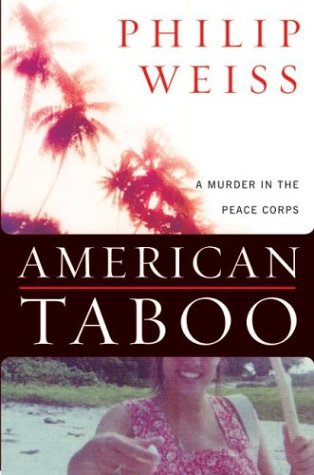June 11, 2004: Headlines: COS - Tonga: Crime: Murder: Safety and Security of Volunteers: Rocky Mountain News: Author Phillip Weiss' research in "American Taboo" is extensive and comprehensive. But in presenting the facts of his labor, he uses an awkward narrative structure to draw conclusions where none are warranted and to construct a story as much about himself as about the murder of Peace Corps Volunteer Deborah Gardner.
Peace Corps Online:
Directory:
Tonga:
Special Report: 'American Taboo: A Murder in the Peace Corps':
June 11, 2004: Headlines: COS - Tonga: Crime: Murder: Safety and Security of Volunteers: Rocky Mountain News: Author Phillip Weiss' research in "American Taboo" is extensive and comprehensive. But in presenting the facts of his labor, he uses an awkward narrative structure to draw conclusions where none are warranted and to construct a story as much about himself as about the murder of Peace Corps Volunteer Deborah Gardner.
American Taboo: A Murder in the Peace Corps
 | Charges possible in 1976 PCV slaying
Congressman Norm Dicks has asked the U.S. attorney in Seattle to consider pursuing charges against Dennis Priven, the man accused of killing Peace Corps Volunteer Deborah Gardner on the South Pacific island of Tonga 28 years ago. Background on this story here and here. |
 | American Taboo
Read the story of Volunteer Deborah Gardner's murder in Tonga in 1976 and how her killer has been free for the past 28 years with the help of the Peace Corps. Read an excerpt from Philip Weiss' book documenting the murder and coverup. Then read an essay by RPCV Bob Shaconis who says that Peace Corps' treatment as a "sacred cow" has exempted it from public scrutiny and that the agency has labored to preserve its shining reputation, sometimes at the expense of the very principles it is supposed to embody. |
Author Phillip Weiss' research in "American Taboo" is extensive and comprehensive. But in presenting the facts of his labor, he uses an awkward narrative structure to draw conclusions where none are warranted and to construct a story as much about himself as about the murder of Peace Corps Volunteer Deborah Gardner.

Author Phillip Weiss' research in "American Taboo" is extensive and comprehensive. But in presenting the facts of his labor, he uses an awkward narrative structure to draw conclusions where none are warranted and to construct a story as much about himself as about the murder of Peace Corps Volunteer Deborah Gardner.
'Taboo' botches lurid tale
By Jill Boyd, Special To The News
June 11, 2004
Author Philip Weiss first heard about the brutal murder of a Peace Corps volunteer during a 1978 trip to Samoa. There, he encountered Bruce, a former Peace Corps volunteer, who told him about 23-year-old Deborah Gardner, a beautiful girl repeatedly stabbed by a fellow volunteer in the exotic jungles of Tonga.
Ten years later, Weiss met another former Peace Corps volunteer, a journalist who knew of Gardner's murder - though he did not correctly recall her name. The meeting compelled Weiss to look up old newspaper articles on the subject.
Finally, his dogged research has resulted in American Taboo: A Murder in the Peace Corps, a provocative, though ultimately unsatisfying look at a strange murder, one that took on mythic proportions within the Peace Corps but is virtually unknown to the world at large.
Deborah Gardner was a young and vibrant teacher from Pullman, Wash., who joined the Peace Corps in search of adventure and to escape the end of a romantic relationship and the monotony of school at Washington State.
While in Tonga, Gardner met Dennis Priven, a volunteer who had come to Tonga with an earlier Peace Corps group. Dennis, writes Weiss, "was shy, mathematical, muscular, with deep-set eyes, a bunch of rubber bands on one wrist, and a high voice with a Brooklyn accent."
While he and Gardner shared "an irreverent sense of humor" and he aided her with repairs in her beach home, the two never achieved a rapport. Priven made Gardner uncomfortable after he spent a lot of money on her. She was not interested in Priven romantically and was afraid he did not understand that.
Emile Hons, another volunteer, warned the Peace Corps director in Tonga that his friend Priven was taking his infatuation with Gardner too far, threatening to wiretap her house or kidnap her cat.
One evening, a Tongan native heard shrieks from Gardner's hut and entered to see a man he identified as Priven holding Gardner in his arms, as though ready to drag her off. Priven dropped her body and fled the scene on bicycle. She lay bleeding to death from numerous stab wounds.
Priven was charged with her murder and faced the longest trial in Tongan history. He was let go on an insanity verdict after a psychologist hired by the Peace Corps testified that Priven was schizophrenic and that his illness led him to kill.
The American government, contends Weiss, "went to considerable lengths to defend him."
True to form, when the author attempted to contact American bureaucrats involved in the case, he discovered these men wished to remain silent.
The Peace Corps and the American government feared a story that would reveal "danger in paradise." The murder of a volunteer would mar the Peace Corps' image, and the government went to considerable lengths to keep the incident hushed.
"They did so," writes Weiss, "to preserve their own careers, to preserve the American presence in the South Pacific, to preserve the churchly image of the Peace Corps."
After returning to the United States, Priven refused to enter a hospital and walked away free.
Given the unusual and persistent coverup, it is certainly a story worth telling.
But the problem lies with the way Weiss constructs it. He tells readers in the first two pages of the book that Gardner was murdered by a fellow volunteer who beat the rap by claiming insanity.
This eliminates any sort of suspense the book might hope to build. Weiss missteps, as well, in the initial pages of American Taboo by explaining that he was not in Tonga when Gardner was murdered. Yet, just a few pages later, the author becomes an omniscient narrator of sorts, explaining what Gardner and other volunteers were thinking decades ago.
"Back in the mezzanine, Vic had noticed her sharp cheekbones and thick, gleaming hair. The exotic and feminine operated on him like an undertow, and he glided toward her."
This is not to say that re-imagining the past cannot be a successful narrative technique. But Weiss' tale seems discombobulated as he sporadically inserts himself as a character in the book, and then again becomes the all-knowing storyteller.
One moment, he's a faceless narrator, recounting how Gardner looked while she danced at a party in Tonga: "Her mouth was open in laughter, her cheeks were dark with color, and thick strings of hair slapped around her face, slicked with saliva, sweat, life juice." The next, he's in the story, standing outside the home of Gardner's mother decades after Gardner's murder.
Much of the lure of the story lies in the enigmatic nature of Gardner's killer. Most of the volunteers tried to avoid Priven, repelled by his intensity and bizarre behavior. For example, "Dennis had cut his door in half, making a kind of Dutch door, and painted a menacing face on his door."
Weiss sums up the inner workings of the man who brutally murdered a woman he loved in this way: "Dennis wasn't just an ordinary man who had snapped, and he wasn't an evil genius either, he was both."
But this seems an easy way out. The description trivializes the crime.
That being said, the subject of the book is fascinating. It has all the makings of a compelling mystery - an enchanting setting, a love triangle, a young life lost too soon, a government coverup and a calculating killer allowed to walk.
Weiss' research is extensive and comprehensive. But in presenting the facts of his labor, he uses an awkward narrative structure to draw conclusions where none are warranted and to construct a story as much about himself as about the murder of Gardner.
It's her death and the bureaucratic manipulation that ensued that make the story. Weiss should have kept a lower profile in his story and more narrowly focused his attention on telling that tale.
Jill Boyd is a journalist living in Longmont.

Some postings on Peace Corps Online are provided to the individual members of this group without permission of the copyright owner for the non-profit purposes of criticism, comment, education, scholarship, and research under the "Fair Use" provisions of U.S. Government copyright laws and they may not be distributed further without permission of the copyright owner. Peace Corps Online does not vouch for the accuracy of the content of the postings, which is the sole responsibility of the copyright holder.
Story Source: Rocky Mountain News
This story has been posted in the following forums: : Headlines; COS - Tonga; Crime; Murder; Safety and Security of Volunteers
PCOL11861
53
.
|
By Alice Alderman (ppp-70-226-173-117.dsl.mdsnwi.ameritech.net - 70.226.173.117) on Sunday, August 06, 2006 - 3:31 pm: Edit Post |
I liked the book. Its style and the unusual presentation of the material brought immediacy and proximity to the event. Its true one fell in love with Debbie, the victim, and that would not happen in the usual prosaic handling of a subject. By the author interjecting himself into the narrative, that made the story more powerful. I absolutely understood and felt how time and people came together but then the unthingable happened, and the sadness stays a permanent part of our history.



